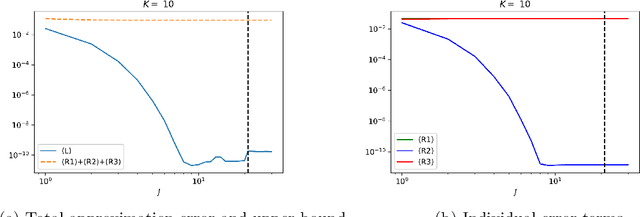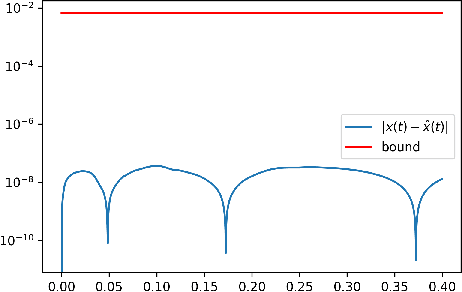Benjamin Russo
Convergence of weak-SINDy Surrogate Models
Oct 03, 2022



Abstract:In this paper, we give an in-depth error analysis for surrogate models generated by a variant of the Sparse Identification of Nonlinear Dynamics (SINDy) method. We start with an overview of a variety of non-linear system identification techniques, namely, SINDy, weak-SINDy, and the occupation kernel method. Under the assumption that the dynamics are a finite linear combination of a set of basis functions, these methods establish a matrix equation to recover coefficients. We illuminate the structural similarities between these techniques and establish a projection property for the weak-SINDy technique. Following the overview, we analyze the error of surrogate models generated by a simplified version of weak-SINDy. In particular, under the assumption of boundedness of a composition operator given by the solution, we show that (i) the surrogate dynamics converges towards the true dynamics and (ii) the solution of the surrogate model is reasonably close to the true solution. Finally, as an application, we discuss the use of a combination of weak-SINDy surrogate modeling and proper orthogonal decomposition (POD) to build a surrogate model for partial differential equations (PDEs).
Occupation Kernel Hilbert Spaces and the Spectral Analysis of Nonlocal Operators
Feb 26, 2021Abstract:This manuscript introduces a space of functions, termed occupation kernel Hilbert space (OKHS), that operate on collections of signals rather than real or complex functions. To support this new definition, an explicit class of OKHSs is given through the consideration of a reproducing kernel Hilbert space (RKHS). This space enables the definition of nonlocal operators, such as fractional order Liouville operators, as well as spectral decomposition methods for corresponding fractional order dynamical systems. In this manuscript, a fractional order DMD routine is presented, and the details of the finite rank representations are given. Significantly, despite the added theoretical content through the OKHS formulation, the resultant computations only differ slightly from that of occupation kernel DMD methods for integer order systems posed over RKHSs.
 Add to Chrome
Add to Chrome Add to Firefox
Add to Firefox Add to Edge
Add to Edge